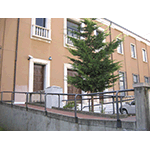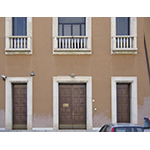Archivio di Stato di Massa [Massa State Archives]
The Massa State Archives, instituted in 1887, are rich in numerous archival sources documenting the history of the territory from the 13th century to modern times. Among the most significant of these is the Ducal, or Secret, Archive, which contains documents dating from 1204 to 1777, including such important ones as the Statutes of Massa and Carrara and parchments linked to the historical events of the various cities. Another very important group of documents is that of the Cybo Malaspina family, a collection of the edicts and proclamations of the sovereigns who governed the little state of Massa and Carrara for over three centuries. The ample archives of the judiciary and notarial offices are accompanied by documentation on the Napoleonic interlude. Highly interesting among the notarial records are documents dealing with the mining, processing and marketing of Apuan marble, including a deed from 1505 that records the hiring by Michelangelo Buonarroti of a boat to transport the blocks of marble required for building the funerary monument of Pope Julius II to Rome.
The Massa State Archives also contain the governmental archives of localities that were in the past outside the Duchy's boundaries, among them Castelnuovo Garfagnana, Fivizzano, Pontremoli and Sarzana. Other documents concerning the Lunigiana area and the Cybo and Malaspina families are now in the State Archives of Florence and Lucca.
Amid the precious heritage of the Massa State Archives, the documents of greatest interest from the scientific viewpoint are found in the private collections. Noteworthy among these are the Malaspina di Olivola archive (1352-1816) for the precious nature of the maps drawn to resolve boundary disputes, and the Fantoni archive (16th century-1915) with a historic collection of educational instruments for the young. Equally important are the Giuseppe Bernieri archive (1859-1898), containing documents on the local marble quarries and on the Carrara railway for transporting marble; and the archive of the engineer Isidoro Raffo (1820-1867), which contains, among other things, documents and projects of civil engineering and hydraulics.
****************************
Texts by Elena Fani
English translation by Catherine Frost
Last update 07/feb/2008





